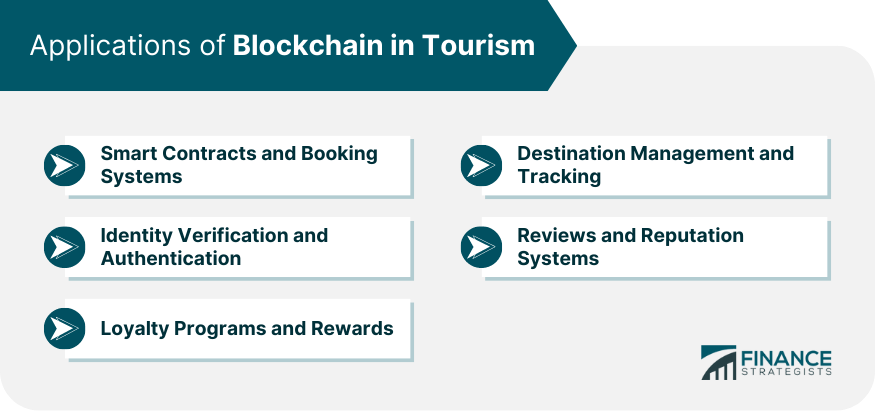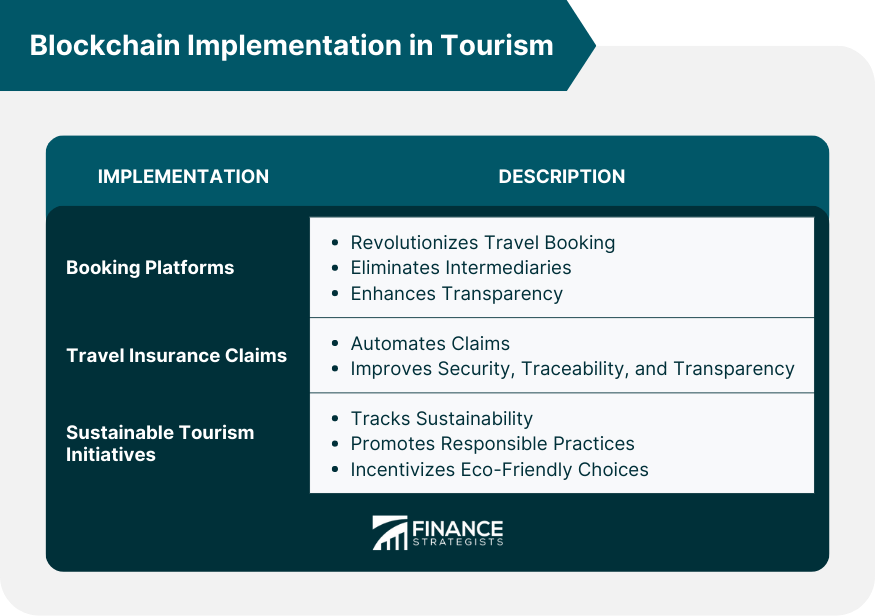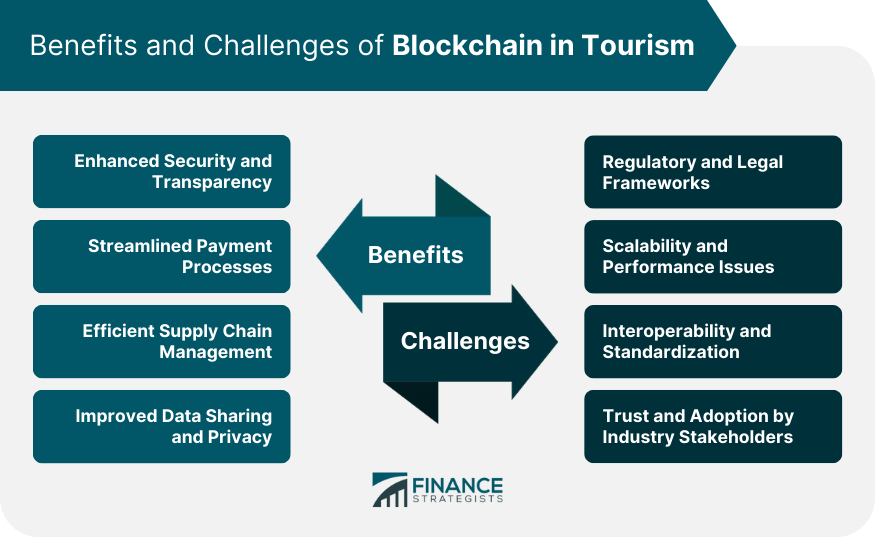Blockchain technology, a decentralized ledger that records all transactions across a network of computers, has grown from its initial application in cryptocurrency to influence a range of industries. The technology's inherent properties, like security, decentralization, and transparency, can significantly impact various sectors, one of which is tourism. The tourism industry, a major global economic driver, has been expanding at a rapid pace. It encompasses various sub-sectors, including travel, accommodation, food and beverage services, recreation, and entertainment. With technological advancements, the industry has shifted towards digital platforms for bookings, reviews, and other services. Although the tourism industry has been progressive in adopting digital tools, it still faces challenges such as inefficiencies in payment systems, lack of transparency, security threats, and inconsistent customer experiences. Blockchain technology holds significant promise to streamline operations and enhance customer experiences in the tourism industry. Smart contracts, self-executing contracts with the terms of an agreement between buyer and seller directly written into code, can revolutionize booking systems. These contracts run on a blockchain, ensuring they are tamper-proof and fully transparent. By incorporating smart contracts, booking platforms can automatically manage reservations, payments, and cancellations, minimizing the need for intermediaries. This can lead to reduced costs for both businesses and consumers, improved efficiency, and increased trust in transactions. Blockchain's potential to verify and authenticate users' identities can dramatically enhance security in the tourism industry. It eliminates the need for physical documents, making the process faster and more efficient. Through blockchain, all necessary information can be securely stored and verified, reducing the risk of identity theft and fraudulent activities. The process becomes more efficient as tourists won't need to repeatedly provide their details for different services, thereby enhancing the overall travel experience. Blockchain can also be a game-changer for loyalty programs and rewards in tourism. Traditional loyalty programs often suffer from fragmentation, lack of transparency, and limited flexibility in point redemption. Through tokenization, blockchain can streamline loyalty programs, making them more transparent and user-friendly. Customers can easily track and redeem their reward points across different platforms, leading to improved customer engagement and loyalty. Destination management involves the coordination and management of all elements that make up a destination, including attractions, amenities, access, and marketing. Blockchain can contribute to improving this aspect by providing accurate and reliable tracking of tourist movements and behaviors. With blockchain, it's possible to capture real-time data about tourist activities, providing valuable insights for businesses and destination managers. This data can guide decision-making, helping to improve service offerings and enhance tourists' experiences. Travelers rely heavily on reviews and ratings to make informed decisions. However, the current systems are susceptible to fraudulent reviews that can mislead consumers. Blockchain technology can help combat this problem. With blockchain, reviews can be verified and attached to a transparent and immutable ledger, thereby enhancing their credibility. This not only helps consumers make more informed decisions but also encourages businesses to maintain high standards of service. Blockchain-based booking platforms can revolutionize how travel is booked and managed. They can eliminate intermediaries, streamline processes, and provide more control and transparency for consumers. For example, platforms can use smart contracts to manage bookings automatically. This can reduce costs, improve efficiency, and enhance consumer trust. Additionally, these platforms can provide real-time availability and pricing information, improving the booking experience for consumers. Blockchain can enhance the management of travel insurance claims, making them more secure and traceable. Through smart contracts, claims processes can be automated, reducing delays and inaccuracies. For instance, smart contracts can be set up to automatically pay out claims when certain conditions are met, like flight delays or cancellations. This not only improves efficiency but also increases transparency, as consumers can track their claims in real time. Blockchain can also contribute to sustainable tourism initiatives. It can help track and verify the sustainability claims of businesses, enhancing accountability and promoting responsible practices. For example, blockchain can be used to track the environmental footprint of different tourism activities. This can encourage sustainable practices and enable tourists to make more environmentally conscious choices. Additionally, tokenization can be used to incentivize sustainable behaviors among tourists and businesses. It can provide secure, traceable transactions and transparent business processes, which can contribute to building trust between businesses and consumers. Moreover, the tamper-proof nature of blockchain ensures that the data is reliable and not subjected to unauthorized changes. This level of security and transparency can improve trust, one of the most important aspects of the tourism industry. Blockchain can revolutionize the way payments are made in the tourism industry. Traditional payment methods often involve intermediaries, leading to increased costs and delays. Through blockchain, transactions can be made directly between parties, reducing the need for intermediaries and resulting in faster and more cost-effective processes. Moreover, the use of cryptocurrencies can eliminate foreign exchange issues, making international transactions smoother. Supply chain management in the tourism industry involves dealing with multiple stakeholders such as hotels, travel agencies, airlines, and restaurants. Blockchain technology can improve coordination among these parties, resulting in a more efficient supply chain. Blockchain can provide real-time tracking and traceability of transactions, which can enhance transparency and accountability in the supply chain. It can also automate processes through smart contracts, leading to operational efficiency. Blockchain can ensure that the right information is available to the right people at the right time, thereby improving coordination and decision-making. Moreover, with its decentralized nature, blockchain can provide better control over data privacy. It can ensure that personal data is stored and shared securely, enhancing consumer trust and compliance with data protection regulations. Despite the potential benefits, blockchain's adoption in tourism can be hindered by regulatory and legal challenges. The technology's novelty means that many countries lack a clear regulatory framework for its application. These regulatory uncertainties can make businesses hesitant to adopt blockchain, fearing potential legal issues. Moreover, it's crucial to establish appropriate laws and regulations to protect consumers and ensure ethical use of the technology. Current blockchain networks can handle only a limited number of transactions per second, which may not be sufficient for large-scale applications in the tourism industry. Moreover, the time taken to validate and add transactions to the blockchain can lead to delays, which could impact customer experiences. Therefore, improving the scalability and performance of blockchain networks is crucial for their effective application in tourism. Another challenge in adopting blockchain in tourism is interoperability – the ability for different blockchain systems to interact with each other. With various blockchain platforms available, the lack of standardization can lead to difficulties in integrating these systems. Standardization can also ensure that blockchain applications in tourism are compatible with existing systems and processes. Therefore, it's important to work towards establishing industry standards for blockchain implementation in tourism. While blockchain can improve trust in transactions, gaining the trust of industry stakeholders to adopt the technology can be a challenge. Many businesses in the tourism industry may be resistant to change due to the perceived complexity and cost of implementing blockchain. Moreover, for blockchain to be effective, it requires broad participation from all stakeholders. Therefore, it's essential to raise awareness about the benefits of blockchain and encourage its adoption across the industry. Blockchain technology holds immense potential to transform the tourism industry by addressing its challenges and improving various aspects of its operations. Blockchain technology revolutionizes tourism with automated transactions, enhanced security, streamlined processes, transparent loyalty programs, improved destination management, and reliable reviews. Its potential to revolutionize various aspects of tourism operations can lead to increased efficiency, trust, and enriched experiences for businesses and travelers alike. Implementing blockchain in tourism requires the development of blockchain-based booking platforms, secure and traceable travel insurance claims, and support for sustainable tourism initiatives. The benefits of blockchain in tourism include enhanced security and transparency, streamlined payment processes, efficient supply chain management, and improved data sharing and privacy. However, the adoption of blockchain in tourism also faces challenges, including regulatory and legal frameworks, scalability and performance issues, interoperability and standardization, and gaining trust and adoption by industry stakeholders.Overview of Blockchain and Tourism
Applications of Blockchain in the Tourism Industry
Smart Contracts and Booking Systems
Identity Verification and Authentication
Loyalty Programs and Rewards
Destination Management and Tracking
Reviews and Reputation Systems

Blockchain Implementation in Tourism
Blockchain-Based Booking Platforms
Secure and Traceable Travel Insurance Claims
Blockchain for Sustainable Tourism Initiatives

Benefits of Blockchain in Tourism
Enhanced Security and Transparency
Streamlined Payment Processes
Efficient Supply Chain Management
Improved Data Sharing and Privacy
Challenges in Adopting Blockchain in Tourism
Regulatory and Legal Frameworks
Scalability and Performance Issues
Interoperability and Standardization
Trust and Adoption by Industry Stakeholders

Conclusion
Blockchain in Tourism FAQs
Blockchain enhances security through its transparent and immutable nature. All transactions are securely recorded on the blockchain, making it virtually impossible to alter or delete them. Moreover, blockchain can facilitate secure identity verification, reducing the risk of fraud and enhancing consumer trust.
Blockchain can streamline payment processes by eliminating intermediaries and allowing direct transactions between parties. This can result in faster and more cost-effective transactions. Additionally, the use of cryptocurrencies can facilitate international transactions, eliminating issues related to currency exchange.
Challenges include regulatory uncertainties, scalability and performance issues, lack of interoperability and standardization, and resistance from industry stakeholders. It's important to address these challenges through regulatory frameworks, technological advancements, industry standards, and awareness-raising to encourage the widespread adoption of blockchain.
Blockchain can track and verify sustainability claims, enhancing transparency and accountability in sustainable tourism initiatives. It can provide reliable data on the environmental impact of tourism activities, enabling consumers to make environmentally conscious choices. Moreover, blockchain can be used to incentivize sustainable behaviors through tokenization.
The future of blockchain in tourism looks promising, with growing recognition of its potential benefits. As the technology matures and regulatory frameworks develop, we can expect more widespread adoption. Blockchain is poised to revolutionize the tourism industry, driving efficiency, transparency, and sustainability.
True Tamplin is a published author, public speaker, CEO of UpDigital, and founder of Finance Strategists.
True is a Certified Educator in Personal Finance (CEPF®), author of The Handy Financial Ratios Guide, a member of the Society for Advancing Business Editing and Writing, contributes to his financial education site, Finance Strategists, and has spoken to various financial communities such as the CFA Institute, as well as university students like his Alma mater, Biola University, where he received a bachelor of science in business and data analytics.
To learn more about True, visit his personal website or view his author profiles on Amazon, Nasdaq and Forbes.











